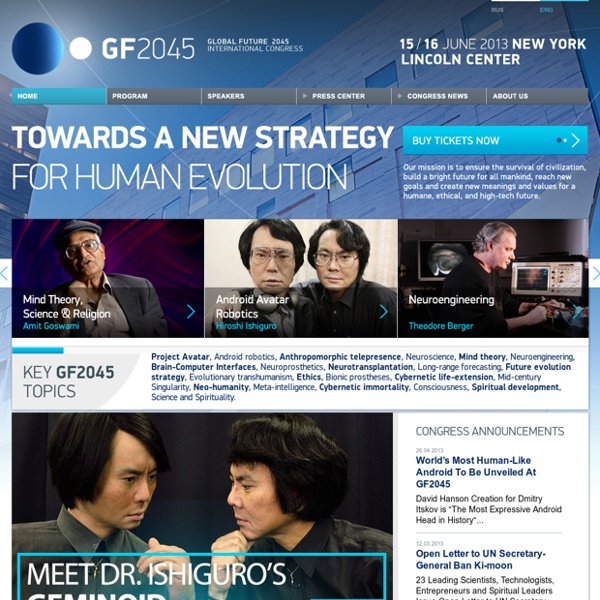



The World Future Council: WFC - Home Ray Kurzweil about GF2045 and 'Avatar' Founded by Russian entrepreneur Dmitry Itskov in February 2011 with the participation of leading Russian specialists in the field of neural interfaces, robotics, artificial organs and systems. The main goals of the 2045 Initiative: the creation and realization of a new strategy for the development of humanity which meets global civilization challenges; the creation of optimale conditions promoting the spiritual enlightenment of humanity; and the realization of a new futuristic reality based on 5 principles: high spirituality, high culture, high ethics, high science and high technologies. The main science mega-project of the 2045 Initiative aims to create technologies enabling the transfer of a individual’s personality to a more advanced non-biological carrier, and extending life, including to the point of immortality. A large-scale transformation of humanity, comparable to some of the major spiritual and sci-tech revolutions in history, will require a new strategy.
Metaphilosophy – David Chalmers Philosophical Studies 171:535-44, 2014. In December 2009, David Bourget and I did a survey of professional philosophers, asking for their views on thirty philosophical questions. There were many interesting results. Philosophy 1:3-31, 2015. Philosophical Review 120:515-66, 2011. In (Chalmers, Manley, and Wasserman, eds.) My remarks at the memorial service for David Lewis at Princeton University on February 8, 2002 . Bluetooth Bluetooth is a wireless technology standard for exchanging data over short distances (using short-wavelength UHF radio waves in the ISM band from 2.4 to 2.485 GHz[2]) from fixed and mobile devices, and building personal area networks (PANs). Invented by telecom vendor Ericsson in 1994,[3] it was originally conceived as a wireless alternative to RS-232 data cables. It can connect several devices, overcoming problems of synchronization. Bluetooth is managed by the Bluetooth Special Interest Group (SIG), which has more than 19,000 member companies in the areas of telecommunication, computing, networking, and consumer electronics.[4] Bluetooth was standardized as IEEE 802.15.1, but the standard is no longer maintained. Name and logo[edit] Bluetooth logo The Bluetooth logo is a bind rune merging the Younger Futhark runes (Hagall) (ᚼ) and (Bjarkan) (ᛒ), Harald's initials. Implementation[edit] Bluetooth operates in the range of 2400–2483.5 MHz (including guard bands). Uses[edit] Bluetooth vs.
Roboethics(Robot Ethics) Info Database | Roboethics(Robot Ethics) Info Database: A Place to Talk about the Newest Technologies and the Ethical Issues Behind Them Commentary » Google It’s exciting for the robotics community that the giants (Google, Apple, and Amazon) are actively investing in robotics. Indeed, my initial response to hearing about Google’s first seven of a series of acquisitions of robotics-related companies was a very positive one (these companies include Shaft, Industrial Perception, Meka Robotics, Redwood Robotics, Bot & Dolly, Autofuss, and Holomni, see Frank Tobe’s article for more details on these companies). Even if Google’s actual direction is to put bipedal robots in self-driving cars so that people can enjoy fast, fully-autonomous door-to-door delivery of flowers on Valentine’s Day, my view was that such investments can only be good for the robotics community. Then I began to feel a little bit uneasy when Google acquired Boston Dynamics. What does this all mean? However, I do applaud the fact that Google is setting up an ethics board to presumably oversee what they will and will not do with their technologies.
Welcome to WFSF The International Flag of Planet Earth The scientific study of flags is called vexillology, and the practice of designing flags is called vexillography. Both of these are an outcome of heraldry. In these practices there are different unofficial design rules/costums, about colors, placement, proportions, typography, and aestethics in general. This proposal is accurate according to the regulations regarding flags. Centered in the flag, seven rings form a flower – a symbol of the life on Earth. Centered on an azure field, seven circles of silver interlaced, creating a flower.
SUSAN SCHNEIDER - Susan Schneider-Philosophy/AI IEEE 802.11 IEEE 802.11 is a set of media access control (MAC) and physical layer (PHY) specifications for implementing wireless local area network (WLAN) computer communication in the 2.4, 3.6, 5 and 60 GHz frequency bands. They are created and maintained by the IEEE LAN/MAN Standards Committee (IEEE 802). The base version of the standard was released in 1997 and has had subsequent amendments. The standard and amendments provide the basis for wireless network products using the Wi-Fi brand. While each amendment is officially revoked when it is incorporated in the latest version of the standard, the corporate world tends to market to the revisions because they concisely denote capabilities of their products. The LinksysWRT54G contains a router with an 802.11b/g radio and two antennae General description[edit] The 802.11 family consists of a series of half-duplex over-the-air modulation techniques that use the same basic protocol. History[edit] Protocol[edit] 802.11-1997 (802.11 legacy)[edit]
Robot Radar